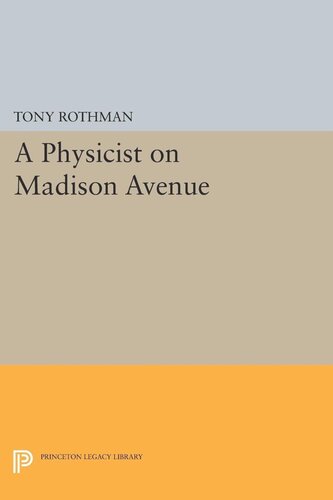

Most ebook files are in PDF format, so you can easily read them using various software such as Foxit Reader or directly on the Google Chrome browser.
Some ebook files are released by publishers in other formats such as .awz, .mobi, .epub, .fb2, etc. You may need to install specific software to read these formats on mobile/PC, such as Calibre.
Please read the tutorial at this link: https://ebookbell.com/faq
We offer FREE conversion to the popular formats you request; however, this may take some time. Therefore, right after payment, please email us, and we will try to provide the service as quickly as possible.
For some exceptional file formats or broken links (if any), please refrain from opening any disputes. Instead, email us first, and we will try to assist within a maximum of 6 hours.
EbookBell Team

4.3
58 reviewsWhether discussing theories of cosmology, the physics of making a violin, or the impact of magazine covers on potential buyers, physicist and writer Tony Rothman brings the worlds of the scientist and nonscientist closer together, with amusing and enlightening results. These essays, which bear the mark of Rothman's outspoken humor and dislike for pretense, convey essential ideas to general readers on such topics as the future of the universe, the design of particle accelerators, the intelligent use of statistics, and the making of quality musical instruments. At the same time they provide insight into how the mind of a scientist works, not only in research but also in the "real" world of three-piece suits and mass media. The outlook of physicists, according to the author, often puts them at odds with nonscientists--but Rothman never hides his points of disagreement. In his title essay on being a major magazine editor, he recalls using bell curves and elementary statistics in an attempt to convince the circulation department that fluctuations in sales are unavoidable (despite what they thought). Although Rothman claims that scientists do enjoy playing the role of Faust, the scholar in eternal pursuit of Truth, his essays attest to a scientific interest fully in tune with human concerns.
Originally published in 1991.
The Princeton Legacy Library uses the latest print-on-demand technology to again make available previously out-of-print books from the distinguished backlist of Princeton University Press. These editions preserve the original texts of these important books while presenting them in durable paperback and hardcover editions. The goal of the Princeton Legacy Library is to vastly increase access to the rich scholarly heritage found in the thousands of books published by Princeton University Press since its founding in 1905.